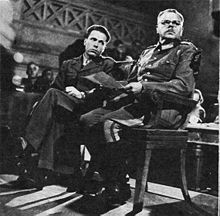Albert O. Hirschman
Appearance

Albert Otto Hirschman (born Otto-Albert Hirschmann; April 7, 1915 – December 10, 2012) was an economist.
| This economist article is a stub. You can help out with Wikiquote by expanding it! |
Quotes
[edit]- At this point, then, a junction is effected between the previously developed train of thought on countervailing passions and the doctrine of interest. Both doctrines originated in Machiavelli; yet the final outcome—the promotion of avarice to the position of the privileged passion given the job of taming the wild ones and of making in this fashion a crucial contribution to statecraft—would have greatly surprised and outraged him.
- The Passions and the Interests (1977) Part I. "How the Interests were Called Upon to Counteract the Passions".
- The welfare state may thus face a wave of hostile public opinion and as a result may well pass through a difficult phase, with the need for consolidation and even retrenchment. However, if the reasons suggested here for the change in the climate of opinion are correct, the trouble could be temporary.
- "The Welfare State in Trouble: Systemic Crisis or Growing Pains?" The American Economic Review (May 1980).
- Which are the arguments and how many are there? I must have an inbred urge toward symmetry. In canvassing for the principal ways of criticizing, assaulting, and ridiculing the three successive "progressive" thrusts of Marshall's story, I have come up with another triad: that is, with three principal reactive-reactionary theses, which I call the perversity thesis or thesis of the perverse effect, the futility thesis, and the jeopardy thesis. According to the perversity thesis, any purposive action to improve some feature of the political, social, or economic order only serves to exacerbate the condition one wishes to remedy. The futility thesis holds that attempts at social transformation will be unavailing, that they will simply fail to “make a dent.” Finally, the jeopardy thesis argues that the code of the proposed chafe or reform is too high as it endangers some previous, precious accomplishment.
- The Rhetoric of Reaction: Perversity, Futility, Jeopardy (1991), Ch. 1 : Two Hundred Years of Reactionary Rhetoric.
- A taste is almost defined as a preference about which you do not argue — de gustibus non est disputandum. A taste about which you argue, with others or yourself, ceases ipso facto being a taste – it turns into a value.
- Rival Views of Market Society and Other Recent Essays (1992), Ch. 6. Against Parsimony.
Exit, Voice, and Loyalty (1970)
[edit]- Exit and voice, that is, market and non market forces, that is, economic and political mechanisms, have been introduced as two principal actors of strictly equal rank and importance.
- Ch. 1. Introduction and Doctrinal Background.
Quotes about Albert O. Hirschman
[edit]- The Passions and the Interests does not have the policy urgency that a contribution to public decisions may enjoy (as Hirschman's The Strategy of Economic Development eminently does), nor the compulsive immediacy that the exigencies of practical reason generate (as Exit, Voice, and Loyalty superbly portrayed). What then is so special about this book? […] The answer lies not only in the recognition that Hirschman makes us see the ideological foundations of capitalism in a fresh way, but also in the remarkable fact that this freshness is derived from ideas that are more than two-hundred-years old. The basic hypothesis— the articulation and development of which Hirschman investigates—makes the case for capitalism rest on the belief that "it would activate some benign human proclivities at the expense of some malignant ones."
- Amartya Sen, Foreword to The Passions and the Interests by Albert O. Hirschman (1996)

